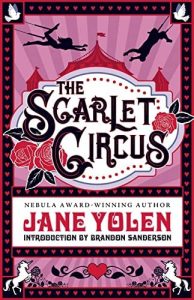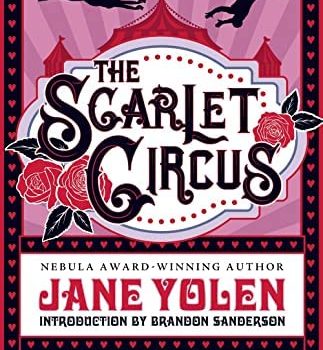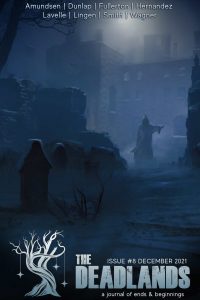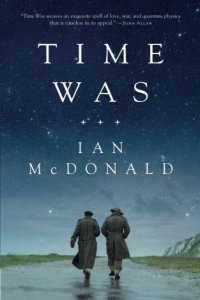Gary K. Wolfe Reviews The Scarlet Circus by Jane Yolen
 The Scarlet Circus, Jane Yolen (Tachyon 9781616963866, $17.95, 256pp, tp) February 2023.
The Scarlet Circus, Jane Yolen (Tachyon 9781616963866, $17.95, 256pp, tp) February 2023.
If you’re thinking about catching up on reading Jane Yolen, forget it. She’s already way ahead of you, with (by her own count) ‘‘well over 400 books, plus thousands of poems and a huge basket load of stories.’’ Of course, a lot of those are children’s and YA titles, but even excluding those, there is a daunting amount of first-rate fiction, both long and short form. This is one reason her series of collections from Tachyon may turn out to be the most convenient entry point for the reader who Brandon Sanderson describes in his introduction to the latest such collection, The Scarlet Circus: ‘‘Maybe you know some of Jane’s other work, and are curious. Maybe you just happened across this volume by chance.’’ That sort of reader, completely innocent of Yolen, seems pretty unlikely to me, but it may well be true that readers familiar with, say, The Devil’s Arithmetic or Wizard’s Hall may be clueless as to where to begin with the short fiction. It’s helpful that each of the Tachyon volumes has been loosely organized around a theme; The Emerald Circus (2017) includes stories drawn from literary or historical sources, How to Fracture a Fairy Tale (2018) features her variations and subversions of familiar fairy tales, The Midnight Circus (2020) highlights her darker fiction (though it seldom slides into traditional horror).
The general theme of The Scarlet Circus is romance, but hardly of the Hallmark-movie variety. Not all these romances work out happily, and some are mixed into tales of dragons, djinns, ghosts, and mermen, with one clever twist on a very familiar Arthurian tale (‘‘The Sword and the Stone’’). The lead story, ‘‘Sans Soleil’’, describes a prince who, believing he is cursed with having to forever avoid the sun, inevitably falls in love, but the ending serves as a kind of mordant commentary on the role of true belief in fairy tales. Three of the stories feature the familiar fairytale motif of three sisters, two of whom might as well be Kardashians and the third a Cinderella figure – an unmarried middle-sister princess in ‘‘The Unicorn Tapestry’’, the mistreated daughter of the king’s defender in ‘‘Dark Seed, Dark Stone’’, the unprepossessing third daughter of a healer in ‘‘Dragonfield’’. Lest we worry that Yolen is reinforcing classic gender roles, each of these tales offers a neat reversal, usually with a slyly feminist twist. Yolen’s characteristic wit is evident in these, but is foregrounded in ‘‘Dusty Loves’’, in which a troublesome fey gets involved with Romeo and Juliet and ‘‘The Erotic in Faerie’’, a brief jape original to the volume which purports to be just the footnotes of a lost essay.
One of the most moving stories here, though, is also the most unabashedly romantic. ‘‘A Ghost of an Affair’’ is a timeslip romance between artisans of different centuries which takes full advantage of its Scottish setting. Almost equally charming is the original story ‘‘Peter in Wonderland’’, whose narrator, a successful writer and self-described spinster, has the ability to visit Carroll’s Wonderland at will, but one birthday finds herself joined there by an unwitting intruder named Peter. As in the earlier anthologies, Yolen offers a generous selection of story notes and new poems written to counterpoint the tales. The note for this one reminds us that Peter is the name of her husband, who – in a tale as romantic as any of these–she reconnected with after many decades and after each had been long widowed. Knowing that, it’s hard not to see ‘‘Peter in Wonderland’’ as Yolen inviting her husband into her wonderland of tales, and we can be glad she invited us along as well.
Gary K. Wolfe is Emeritus Professor of Humanities at Roosevelt University and a reviewer for Locus magazine since 1991. His reviews have been collected in Soundings (BSFA Award 2006; Hugo nominee), Bearings (Hugo nominee 2011), and Sightings (2011), and his Evaporating Genres: Essays on Fantastic Literature (Wesleyan) received the Locus Award in 2012. Earlier books include The Known and the Unknown: The Iconography of Science Fiction (Eaton Award, 1981), Harlan Ellison: The Edge of Forever (with Ellen Weil, 2002), and David Lindsay (1982). For the Library of America, he edited American Science Fiction: Nine Classic Novels of the 1950s in 2012, with a similar set for the 1960s forthcoming. He has received the Pilgrim Award from the Science Fiction Research Association, the Distinguished Scholarship Award from the International Association for the Fantastic in the Arts, and a Special World Fantasy Award for criticism. His 24-lecture series How Great Science Fiction Works appeared from The Great Courses in 2016. He has received six Hugo nominations, two for his reviews collections and four for The Coode Street Podcast, which he has co-hosted with Jonathan Strahan for more than 300 episodes. He lives in Chicago.
This review and more like it in the January 2023 issue of Locus.
 While you are here, please take a moment to support Locus with a one-time or recurring donation. We rely on reader donations to keep the magazine and site going, and would like to keep the site paywall free, but WE NEED YOUR FINANCIAL SUPPORT to continue quality coverage of the science fiction and fantasy field.
While you are here, please take a moment to support Locus with a one-time or recurring donation. We rely on reader donations to keep the magazine and site going, and would like to keep the site paywall free, but WE NEED YOUR FINANCIAL SUPPORT to continue quality coverage of the science fiction and fantasy field.
©Locus Magazine. Copyrighted material may not be republished without permission of LSFF.







